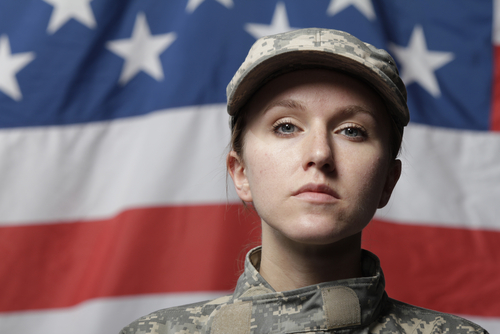 Americans hold a special place for vets returning from active duty. Even closer to our nation’s heart are female veterans who often return from combat duty to take up lives as mother, wife, and friend. Though no more or less difficult than a male’s transition into civilian life, studies show female vets experience unique challenges and need special assistance. Research published in the Journal of Women’s Health found women use more outpatient services than men, while men use more inpatient services. One interpretation of this is that women, if given the right assistance, can come back to a state-side life without needing large interventions. As loved ones, we can help make the transition easier.
Americans hold a special place for vets returning from active duty. Even closer to our nation’s heart are female veterans who often return from combat duty to take up lives as mother, wife, and friend. Though no more or less difficult than a male’s transition into civilian life, studies show female vets experience unique challenges and need special assistance. Research published in the Journal of Women’s Health found women use more outpatient services than men, while men use more inpatient services. One interpretation of this is that women, if given the right assistance, can come back to a state-side life without needing large interventions. As loved ones, we can help make the transition easier.
Curb The Paranoia
If your returning vet was a desk jockey at Fort Drum then civilian life may not be a stretch, but a soldier in Iraq or Afghanistan needs a veneer of mindfulness to keep her safe. The safety habit can turn into ungrounded fear and paranoia if not properly focused. At home, an alarm system will allow her to get a good night’s sleep. Since the first six months back may be filled with forms, documents, and signatures as the veteran reestablishes her new life, identity theft protection will help her stop looking over her shoulder. With time and a loving environment, she will be able to leave some of the fear overseas.
Be A Friend
She does not need you to fix her problems. A therapist can handle mental trauma and a physician can prescribe medication. What she needs from you is a support network. The lack of social support is one of the biggest factors in the mental decline of veterans suffering Post-Traumatic Stress Disorder and a variety of other military service-related mental health issues, reports the American Psychological Association. Studies show that vets with good friends have less severe symptoms, are able to transition into civilian life easier, and are more likely to avail themselves of help if they need it. Be a source of laughter and a shoulder to cry on.
When Combat Is Not Combat
At the 2013 American Public Health Association conference, panelists discussed the importance of allowing a soldier the opportunity to define her own perception of combat. Many women in the military services hold caretaking roles and never lift a gun. For these women, combat means caring for the wounded and potentially seeing them die. Though they have never pulled a trigger, their experiences are no less horrific, traumatizing and significant as a front line soldier’s. Whatever experiences your vet has, acknowledge them as uniquely hers.
Be A Resource
Sometimes laughter, conversation, and a hug are not enough. Almost 3 percent of female veterans are diagnosed with an eating disorder, reports Psychology Research. About one-third are diagnosed with PTSD and nearly half are at high risk of drinking abuse, notes Veterans Affairs Center of Excellence for Stress and Mental Health. This is where friendship has its benefits. You cannot make your veteran get help but you can be a resource for her. The Veteran’s Administration website is filled with helpful resources, advice and interventions that you can use to support the well-being of our returning military personnel. With the right care, returning female veterans do not need to struggle to have a new, happy life.


